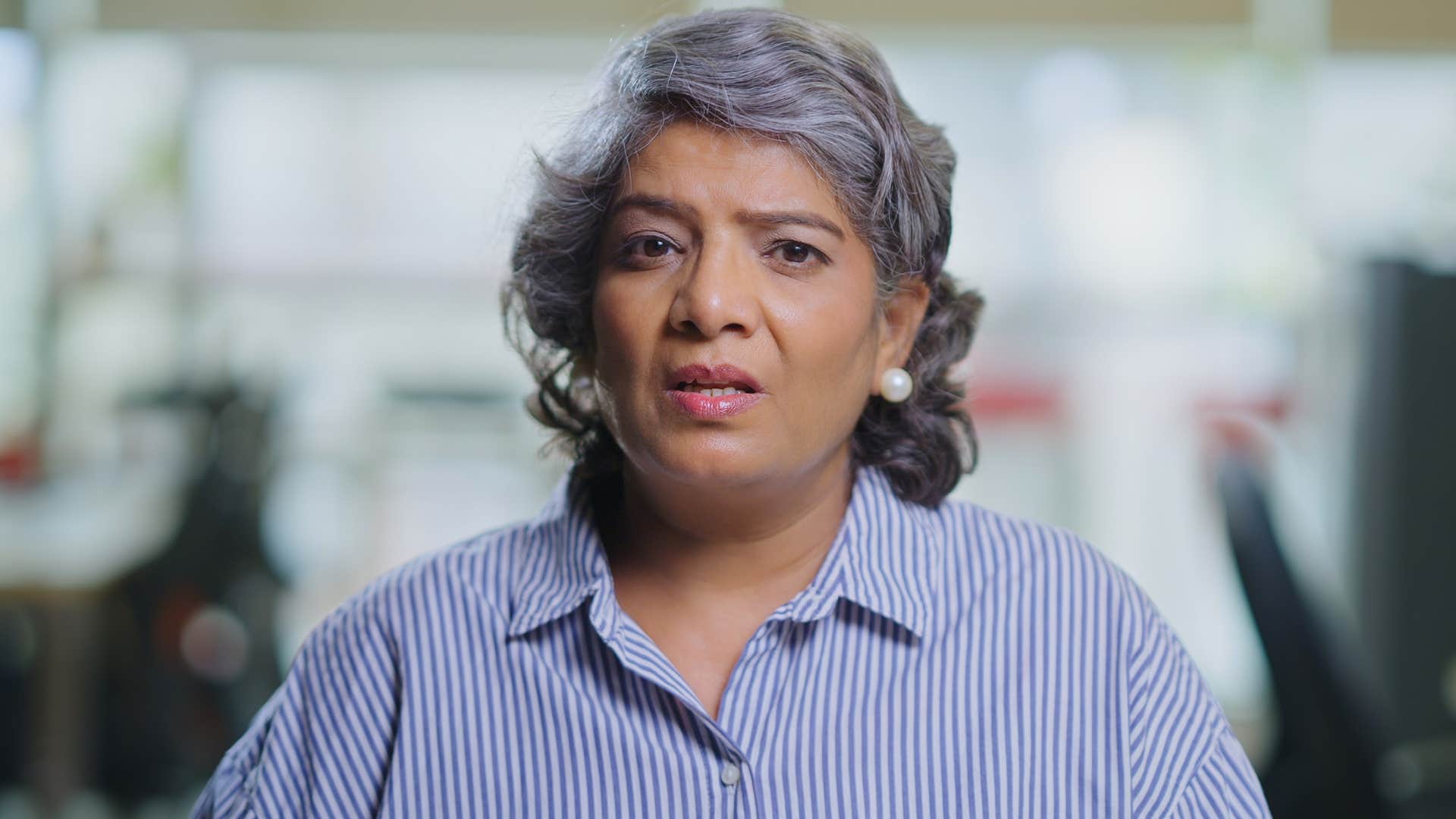11 Common Words That Are Somehow Considered Inappropriate To Say Out Loud In Certain Circles
Politeness is a construct that's always evolving.
 fizkes | Shutterstock
fizkes | Shutterstock From cultural context to generational differences, social expectations, and personal identity, many things influence a person’s language and the words they choose to use in any given space. What might feel grounding and validating in one room with friends or peers are probably the same phrases that are misunderstood and faltering in another.
For example, there are many common words that are somehow considered inappropriate to say out loud in certain circles, that in other people’s minds are innocent, unsuspecting, and more than appropriate. It’s all about expectations of politeness, personal beliefs, and, of course, the vibe of any given room — those are the basic things that influence someone’s language on any given basis.
Here are 11 common words that are somehow considered inappropriate to say out loud in certain circles
1. ‘Guys’
 PeopleImages | Shutterstock
PeopleImages | Shutterstock
In the wrong room, the word “guys” or a phrase like “hey, guys” can ruffle some feathers. Of course, it’s true that a phrase like this can be invalidating to some people and acts as an assumption of someone’s gender, but for the most part, it’s a language tic that has nothing to do with the people around them.
It’s one of the common words that are somehow considered inappropriate to say out loud in certain circles, for a good reason in some cases, but is often misunderstood.
2. ‘Hysterical’
 PeopleImages | Shutterstock
PeopleImages | Shutterstock
There are many nuances to contextualize the inappropriate nature of using a word like “hysteria” in certain circles. For example, the link between women, mental health, and “female hysteria” claims in history provides a foundation — women were often gaslit and manipulated for things men didn’t experience or understand.
So, when people call women “hysterical” now, they’re not just being condescending — they’re being toxically misogynistic. That’s why it’s one of the common words that are somehow considered inappropriate to say out loud in certain circles, especially toward and around women.
3. ‘Obviously’
 PeopleImages | Shutterstock
PeopleImages | Shutterstock
When you correct someone’s language, fix their grammar, or share wisdom using the word “obviously,” it immediately sounds like you’re being patronizing. It’s often one of the habits of people who think they’re better than everyone else — they’re always saying “obviously” as a means of inflating their own ego or bringing other people down.
“Obviously, everyone knows that” is just one of the examples. That’s why it’s one of the common words that are somehow considered inappropriate to say out loud in certain circles, because in the mouths of the wrong person, it can come across in a very condescending way.
4. ‘Actually’
 Zamrznuti tonovi | Shutterstock
Zamrznuti tonovi | Shutterstock
Many people, in a number of circles, find the word “actually” to be incredibly condescending, patronizing, and rude. If you’re complimenting someone, don’t use “actually,” as it only sounds like a passive-aggressive way of reminding someone that you’re surprised they’re actually attractive, smart, or successful.
It’s one of the common words that are somehow considered inappropriate to say out loud in certain circles, because to the wrong person or in the wrong context, it can be incredibly hurtful.
5. ‘Exotic’
 Raushan_films | Shutterstock
Raushan_films | Shutterstock
Even if it’s offered with good intentions, a phrase like “exotic” often leverages the feeling of “otherness” to their own advantage or entertainment. Even if it’s intended to call someone into a conversation or interaction, it only further excludes them on the basis of their differences.
In certain circles of progressive people and younger generations, this is one of the common words that is grossly inappropriate. Of course, not everyone who says it is a “bad person” with malicious intent, but for the “cancel culture generation,” it’s hard to differentiate.
6. ‘Girlboss’
 Jacob Lund | Shutterstock
Jacob Lund | Shutterstock
Even if it was used as an empowering and uplifting term for women entering the workforce, making their own money, and breaking free from traditional stereotypes, “girlboss” is now one of the common words that are somehow considered inappropriate to say out loud in certain circles.
Specifically, when you’re around Gen Zers, “girlboss” may have come to be problematic again — calling out a person’s gender in relation to their success, like it’s important to note. For some older generations, their gender identity is important to realize, as it proves their ability to thrive even in a patriarchal society.
Of course, many Gen Zers understand that and recognize the struggles women face in professional environments, but find “girlboss” to misuse feminism. You don’t need to be a certain gender to be a “boss,” so why create the term “girlboss” at all?
7. ‘Touch base’
 PeopleImages | Shutterstock
PeopleImages | Shutterstock
According to a study from the University of Florida, overusing corporate jargon in the workplace can often reduce employee morale, sabotage company culture, and make new employees feel excluded and confused.
Phrases like “touch base” and “circle back” may be a misguided sign of professionalism for older people, but for new employees and younger professionals, they’re phrases and words that simply lack clarity.
8. ‘Like’
 PeopleImages | Shutterstock
PeopleImages | Shutterstock
Filler words like “like” or “um” can often be a sign of nervousness, a lack of attention, or insecurity in some rooms, but a relatable bridge to connect with people in others. It’s all about how they’re used, how frequently they come up, and the people you’re surrounded by.
If you’re giving an important presentation or speech to a group of strict, overly polite, professional people, chances are the overuse of filler words isn’t going to make them feel closer to you, but annoyed and judgmental. So, if you can, save them for your friends or potential connections, not for work or strict, new environments.
9. ‘Honestly’
 PeopleImages | Shutterstock
PeopleImages | Shutterstock
“Honestly” is one of the common words that’s somehow considered inappropriate to say out loud in certain circles, like being at work or with a group of new friends. Of course, “honestly” tends to sound like you’re telling the truth for the first time, but that’s not always the case.
But like many of the other words and phrases that are misunderstood and offensive in the wrong rooms, “honestly” is just another thing to be wary of using, especially if you’re trying to build trust or prove a point.
10. ‘Adulting’
 BongkarnGraphic | Shutterstock
BongkarnGraphic | Shutterstock
For older generations that’ve spent decades navigating adulthood and dealing with struggles in their lives, hearing a phrase like “adulting” from Gen Zers and millennials can feel annoying, at the very least. It’s one of the common words that are somehow considered inappropriate to say out loud in certain circles, with certain age demographics.
For younger generations that still feel young and struggle with accepting the responsibilities of growing up, “adulting” feels more comforting — rather than “being an adult.” But it’s still annoying and sometimes even invalidating for older generations who are easily frustrated by shifting language and ideals in younger generations.
11. ‘Later’
 Krakenimages.com | Shutterstock
Krakenimages.com | Shutterstock
If you’re going to take the time to say goodbye to someone or excuse yourself from a room, at least put some intentionality into it. It’s not about the length of a goodbye, because a “bye” is often better than a “later,” but the engagement and attention someone offers others in any given room.
It’s one of the common words that are somehow considered inappropriate to say out loud in certain circles, not necessarily amongst younger generations that are prone to an “Irish goodbye,” but in professional work spheres, and with done-up, polite people.
Zayda Slabbekoorn is a senior editorial strategist with a bachelor’s degree in social relations & policy and gender studies who focuses on psychology, relationships, self-help, and human interest stories.

